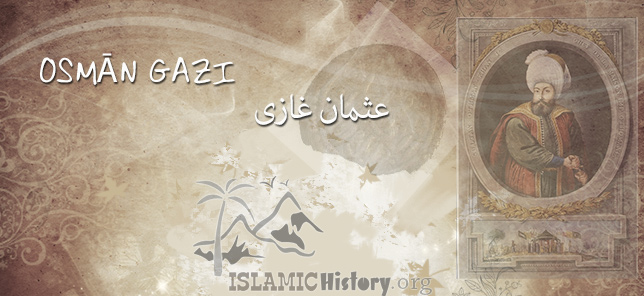Osman I or Osman Gazi, sometimes transliterated archaically as Othman, was the leader of the Ottoman Turks and the founder of the Ottoman dynasty. The dynasty bearing his name later established and ruled the nascent Ottoman Empire
OSMANS NAME :
Some scholars have argued that Osman’s original name was Turkish, probably Atman or Ataman, and was only later changed to ʿOsmān, of Arabic origin. The earliest Byzantine sources, including Osman’s contemporary George Pachymeres, spell his name as Ατουμάν (Atouman) or Ατμάν (Atman), whereas Greek sources regularly render both the Arabic form ʿUthmān and the Turkish version ʿOsmān with θ, τθ, or τσ. An early Arabic source mentioning him also writes ط rather than ث in one instance. Osman may thus have adopted the more prestigious Muslim name later in his life.
OSMANS DREAM :
Main article: Osman’s Dream
Osman, I had a close relationship with a local religious leader of dervishes named Sheikh Edebali, whose daughter he married. A story emerged among later Ottoman writers to explain the relationship between the two men, in which Osman had a dream while staying in the Sheikh’s house.[19] The story appears in the late fifteenth-century chronicle of Aşıkpaşazade as follows:
He saw that a moon arose from the holy man’s breast and came to sink in his own breast. A tree then sprouted from his navel and its shade compassed the world. Beneath this shade there were mountains, and streams flowed forth from the foot of each mountain. Some people drank from these running waters, others watered gardens, while yet others caused fountains to flow. When Osman awoke he told the story to the holy man, who said ‘Osman, my son, congratulations, for God has given the imperial office to you and your descendants and my daughter Malhun shall be your wife.
MILITARY VICTORIES :
Illustration of Osman rallying Gazi warriors into battle.
According to Shaw, Osman’s first real conquests followed the collapse of Seljuk’s authority when he was able to occupy the fortresses of Eskişehir and Karacahisar. Then he captured the first significant city in his territories, Yenişehir, which became the Ottoman capital.[18]
In 1302, after soundly defeating a Byzantine force near Nicaea, Osman began settling his forces closer to Byzantine controlled areas.[23]
Alarmed by Osman’s growing influence, the Byzantines gradually fled the Anatolian countryside. Byzantine leadership attempted to contain Ottoman expansion, but their efforts were poorly organized and ineffectual. Meanwhile, Osman spent the remainder of his reign expanding his control in two directions, north along the course of the Sakarya River and southwest towards the Sea of Marmara, achieving his objectives by 1308.[18] That same year his followers participated in the conquest of the Byzantine city of Ephesus near the Aegean Sea, thus capturing the last Byzantine city on the coast, although the city became part of the domain of the Emir of Aydin.[23]
Osman’s last campaign was against the city of Bursa.[24] Although Osman did not physically participate in the battle, the victory at Bursa proved to be extremely vital for the Ottomans as the city served as a staging ground against the Byzantines in Constantinople, and as a newly adorned capital for Osman’s son, Orhan. Ottoman tradition holds that Osman died just after the capture of Bursa, but some scholars have argued that his death should be placed in 1324, the year of Orhan’s accession.[25]
FAMILY :
Türbe (tomb) of Osman in Bursa
Due to the scarcity of sources about his life, very little is known about Osman’s family relations. According to certain fifteenth-century Ottoman writers, Osman was descended from the Kayı branch of the Oghuz Turks, a claim which later became part of the official Ottoman genealogy and was eventually enshrined in the Turkish Nationalist historical tradition with the writings of M. F. Köprülü.[26] However, the claim to Kayı lineage does not appear in the earliest extant Ottoman genealogies. Thus many scholars of the early Ottomans regard it as a later fabrication meant to shore up dynastic legitimacy with regard to the empire’s Turkish rivals in Anatolia.[11]
It is very difficult for historians to determine what is factual and what is legendary about the many stories the Ottomans told about Osman and his exploits, and the Ottoman sources do not always agree with each other.[27] According to one story, Osman had an uncle named Dündar with whom he had a quarrel early in his career. Osman wished to attack the local Christian lord of Bilecik, while Dündar opposed it, arguing that they already had enough enemies. Interpreting this as a challenge to his leadership position, Osman shot and killed his uncle with an arrow.[28] This story does not appear in many later Ottoman historical works. If it were true, it means that it was likely covered up in order to avoid tarnishing the reputation of the Ottoman dynasty’s founder with the murder of a family member. It may also indicate an important change in the relationship of the Ottomans with their neighbors, shifting from relatively peaceful accommodation to a more aggressive policy of conquest.[29]
1st Ottoman Sultan (Bey)
Reign: c. 1299 ‒ 1326
Successor Orhan
Born: c. 1258[2]
Sultanate of Rum
Died: c. 1326 (aged 67–68)[2]
Bursa, Ottoman Beylik
Burial Tomb of Osman I, Bursa
Spouse Malhun Hatun
wife: Rabia Bala Hatun
Issue See below
Full name:
Osman bin Ertuğrul
عثمان بن ارطغرل
Ottoman Turkish عثمان غازى
Turkish Osman Gazi
Dynasty Imperial House of Osman
Father Ertugrul
Mother Unknown[1]
Religion: Islam
DRAMA:
A drama related to Osman Gazi called (KURULS OSMAN ) the actor of osman is BURAK OZCIVIT

